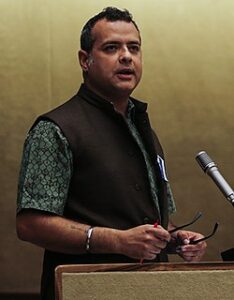The Remarkable Decline In The Global North’s Leadership
No Comments yet
Vijay Prashad
03-05-2-24 ~ A group of young people in Paris are enjoying a drink in a café on an unseasonably warm evening. The conversation drifts into politics, but—as one young woman says—“Let’s not talk about France.” The others nod their assent. They focus on the U.S. presidential election, a slight bit of Gallic arrogance at play as they mock the near certainty that the main candidates will be President Joe Biden and former President Donald Trump. Biden is 81 years old and Trump is 77. A Special Counsel in the United States has called Biden an “elderly man with a poor memory,” hardly the words required to inspire confidence in the president. Trying to defend himself, Biden made the kind of gaffe that is fodder for online memes and affirmed the report that he tried to undermine: he called President Abdel Fattah El-Sisi of Egypt the “president of Mexico.” No new evidence is required, meanwhile, to mock the candidacy of Trump. “Is this the best that the United States can offer?” asks Claudine, a young student at a prestigious Parisian college.
These young people are aware enough that what appears to be comical on the other side of the Atlantic—the U.S. presidential election—is no less ridiculous, and of course less dangerous, in Europe. When I ask them what they think about the main European leaders—Olaf Scholz of Germany and Emmanuel Macron of France—they shrug, and the words “imbecilic” and “non-entity” enter the discussion. Near Les Halles, these young people have just been at a demonstration to end the Israeli bombing of the Rafah region of Gaza. “Rafah is the size of Heathrow Airport,” says a young student from England who is spending 2024 in France. That none of the European leaders have spoken plainly about the death and destruction in Gaza troubles them, and they say that they are not alone in these feelings. Many of their fellow students feel the same way. The approval ratings for Scholz and Macron decline with each week. Neither the German nor the French public believes that these men can reverse the economic decline or stop the wars in either Gaza or Ukraine. Claudine is upset that the governments of the Global North have decided to cut their funding for the United Nations Relief and Works Agency (UNRWA), the UN Palestine agency, although another young person, Oumar, interjects that Brazil’s President Lula has said that his country will donate money to UNRWA. Everyone nods.
A week later, news comes that a young soldier in the United States Airforce—Aaron Bushnell—has decided to take his own life, saying that he will no longer be complicit in the genocide against the Palestinians. When asked about the death of Bushnell, White House press secretary Karine Jean-Pierre said that the President is “aware” and that it is a “horrible tragedy.” But there was no statement about why the young man took his life, and nothing to assuage a tense public about the implications of this act. Eating an ice cream in New York, U.S. President Joe Biden said that he hoped that there would be a ceasefire “by the beginning of the weekend” but then moved it to “by next Monday.” The meandering statements, the pledge for a ceasefire alongside the prevarication, and the arms deliveries do not raise the confidence of anyone in Biden or his peers in Europe. With the Emir of Qatar beside him, France’s President Emmanuel Macron called for a “lasting ceasefire.” These phrases—“lasting ceasefire” and “sustainable ceasefire”—have been bandied about with these adjectives (lasting, sustainable) designed to dilute the commitment to a ceasefire and to pretend that they are actually in favor of an end to the war when they continue to say that they are behind Israel’s bombing runs.
In London, the UK Parliament had a comical collapse in the face of a Scottish National Party (SNP) resolution for a ceasefire. Rather than allow a vote to show the actual opinions of their members, both the Labour Party and the Conservative Party went into a tailspin and the Parliament’s speaker broke rules to ensure that the elected officials did not have to go on the record against a ceasefire. Brendan O’Hara of the SNP put the issue plainly before the Parliament before his words and the SNP resolution was set aside: “Some will have to say that they chose to engage in a debate on semantics over ‘sustainable’ or ‘humanitarian’ pauses, while others will say that they chose to give Netanyahu both the weapons and the political cover that he required to prosecute his relentless war.”
Global desire for an immediate stop to the Israeli bombing is now at an all-time high. For the third time, the United States vetoed a UN resolution in the Security Council to compel the Israelis to stop the bombing. That the United States and its European allies continue to back Israel despite the widespread disgust at this war—exemplified by the death of Aaron Bushnell—raises the frustration with the leadership of the Global North. What is so particularly bewildering is that large sections of the population in the countries of the North want an immediate ceasefire, and yet their leaders disregard their opinions. One survey shows that two-thirds of voters in the United States—including majorities of Democrats (77 percent), Independents (69 percent), and Republicans (56 percent)—are in favor of a ceasefire in Gaza. Interestingly, 59 percent of U.S. voters say that Palestinians must be guaranteed the right to return to their homes in Gaza, while 52 percent said that peace talks must be held for a two-state solution. These are all positions that are ignored by the main political class on both sides of the Atlantic Ocean. The qualifications of “lasting” and “sustainable” only increase cynicism among populations that watch their political leadership ignore their insistence on an immediate ceasefire.
Clarity is not to be sought in the White House, in No. 10 Downing Street, or in the Élysée Palace. It is found in the words of ordinary people in these countries who are heartsick regarding the violence. Protests seem to increase in intensity as the death toll rises. What is the reaction to these protests? In the United Kingdom, members of parliament complained that these protests are putting the police under “sustained pressure.” That is perhaps the point of the protests.
By Vijay Prashad
Author Bio: This article was produced by Globetrotter.
Vijay Prashad is an Indian historian, editor, and journalist. He is a writing fellow and chief correspondent at Globetrotter. He is an editor of LeftWord Books and the director of Tricontinental: Institute for Social Research. He has written more than 20 books, including The Darker Nations and The Poorer Nations. His latest books are Struggle Makes Us Human: Learning from Movements for Socialism and (with Noam Chomsky) The Withdrawal: Iraq, Libya, Afghanistan, and the Fragility of U.S. Power.
Source: Globetrotter
You May Also Like
Comments
Leave a Reply







